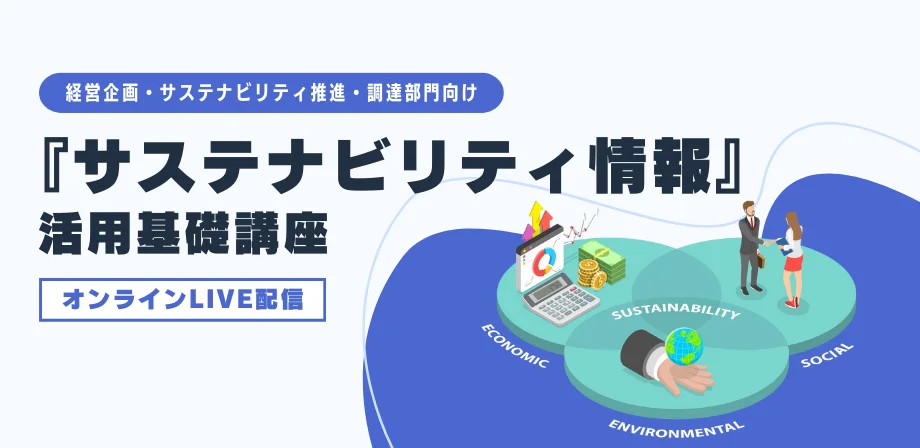【3/27〜4/2】の国際的なESG関連ニュースをまとめてお届けします。
【TNFD】自然関連財務情報開示フレームワークの最終案(β0.4)を公開
(2023/3/28)
- 開示と企業報告に対する全体的なアプローチに、6つの一般要求事項を備えた新しい構成要素を導入。
- TCFD提言の4つのピラー(ガバナンス、戦略、リスクマネジメント、指標と目標)を維持し、インパクトマネジメントをリスクマネジメントに組み込んだ。
- TCFDが推奨する全11項目の開示をTNFDが推奨する開示に引き継ぎ、内容に一貫性を持たせ、気候関連項目とともに自然関連項目の報告も開始できるようにした。
- バリューチェーンへの影響(Scope3の気候報告)を組み込むためのアプローチを、ダイレクト、上流、下流、資金提供という自然な文脈に適応させた。
【EU】e-Fuels(合成燃料)使用を認め、2035年までに新車のゼロエミッションを義務付ける規則を採択
(2023/3/28)
- 欧州理事会は、2030年までに温室効果ガス排出量を1990年比で55%削減するというロードマップ「Fit for 55」の一環として、2035年からEUで登録される新車(乗用車および小型商用車)のCO2排出量を100%削減することを求める新規制を採択した。
- この新規制には、2030年までに、新たに販売される乗用車のCO2排出量を2021年比で55%、小型商用車では50%削減することを求める中間目標も含まれている。
e-Fuels(合成燃料)とは
CO2(二酸化炭素)と再生可能エネルギー由来のH2(水素)を合成して製造される燃料。CO2を資源として利用する「カーボンリサイクル」に貢献することになるため、「脱炭素燃料」とみなすことができると考えられている。
【EU】セクター別サステナビリティ報告基準の公表を延期
(2023/3/29)
- 欧州財務報告諮問グループ(EFRAG)によると、セクター別の欧州サステナビリティ報告基準(ESRS)の公表が延期されることになった。
- EFRAGは、2014年の非財務情報開示指令(NFRD)の内容を更新・強化した企業サステナビリティ報告指令(CSRD)に基づき、欧州委員会 金融安定・金融サービス・資本市場同盟担当委員のメイリード・マクギネス氏より、企業へのESRS導入支援作業を優先するよう要請を受け、延期を決定した。
- EFRAGは、セクターを問わず基準をカバーできる草案をすでに発表しており、セクター別基準の発表は今年後半になると予想されている。しかし、EFRAGはEUの要請により、スケジュールを修正し作業を進める予定だ。
【EU】エネルギーミックス(電源構成最適化)のため、2030年までに再生可能エネルギーの割合をほぼ倍増させる協定を締結
(2023/3/30)
- EUは、2030年までにエネルギー消費に占める再生可能エネルギーの割合を42.5%に引き上げるという拘束力のある目標を設定した。これは、現在の2030年目標の32%から大幅に増加し、ロードマップ「Fit for 55」で提案された当初の40%よりもさらに高い数値となる。
- この合意には、輸送、産業、建築および域内の冷暖房施設等に及ぶまで、より野心的な目標が含まれている。例えば、建築物については、2030年までに再生可能エネルギーの割合を49%以上とすることを目標とし、産業界においては、使用割合を毎年1.6%増加させることを要求している。
- また、ロシア産エネルギー依存からの脱却計画「REPowerEU」計画における再生可能エネルギーの導入を早めるため、エネルギー用のバイオマス利用基準の強化や、再生可能エネルギープロジェクトの許可手続きの迅速化も盛り込まれている。
【カナダ】800億ドル超のクリーンテック及びクリーンエネルギーへの投資を発表
(2023/3/31)
- カナダ政府は、グリーンエネルギーとクリーンテックの規模拡大のため、2023年予算で600億ドルを超える税額控除と、200億ドルのサステナブル・インフラへの追加投資方針を打ち出した。
- この計画は、カナダが、脱炭素及びクリーンエネルギーシステムへの移行を目指す世界的な競争に対応し、国際経済と歩調を合わせる姿勢を意味している。
- 2035年までに250億ドル以上となる本予算は、クリーンエネルギー投資の税額控除が大部分を占める。この税額控除には、温室効果ガス非排出電力システム、クリーン水素製造、クリーン製造技術、二酸化炭素の回収・利用・貯蔵、ゼロエミッション車への投資に対する税額控除が含まれる。また、カナダ・インフラ銀行(CIB)は、クリーンエネルギー優先分野に100億ドル、グリーンインフラ優先分野に100億ドルを投資する予定。
【ミュンヘン再保険】Net Zero Insurance Allianceから脱退
(2023/3/31)
- ドイツ・ミュンヘンに拠点を置く世界最大の再保険会社ミュンヘン再保険は、独禁法上のリスクから、Net Zero Insurance Alliance(NZIA)を脱退。NZIAは、保険会社が保険引受やリスク管理を通じて、温室効果ガス(GHG)排出量正味ゼロへの移行を支援することを目的としている。
- 同社は、2025 年末までに投資ポートフォリオに関連する温室効果ガス(GHG)排出量を 29% 削減、2030年までに事業部門における温室効果ガス(GHG)排出量をネットゼロに、2050 年までに全社的にネットゼロを達成するという個別の削減目標を引き続き掲げている。
- 同社はNZIAを脱退するものの、 Glasgow Financial Alliance for Net Zero (GFANZ)への参加は継続し、2050 年までに温室効果ガス(GHG)排出量がネットゼロとなるよう、石油・ガス等の使用の削減を約束している。
A summary of global ESG-related news [27th Mar-2nd Apr].
TNFD releases final draft (beta 0.4) of nature-related financial disclosure framework
(Mar 28, 2023)
- Introduced a new general requirements component to the overall approach to disclosure and corporate reporting with 6 general requirements.
- Retained the four pillars of the TCFD Recommendations – Governance, Strategy, Risk Management and Metrics and Targets – with Impact Management incorporated into Risk Management.
- Carried over all 11 TCFD recommended disclosures into the TNFD recommended disclosures, providing consistency of content and enabling report users to start reporting on nature-related issues with climate-related issues.
- Adapted the approach taken to incorporate value chain impacts (Scope 3 climate reporting) to the nature context as direct operations, upstream, downstream and financed.
EU Adopts Rules Requiring Zero Emissions from New Cars by 2035 After Reaching Deal on e-Fuels
(Mar 28, 2023)
- The European Council has adopted a new regulation requiring a 100% reduction in CO2 emissions from new cars and vans registered in the EU from 2035, as part of the European Commission’s “Fit for 55” roadmap to cut greenhouse gas emissions by 55% by 2030, compared to 1990 levels.
- The new regulation also includes interim targets requiring a 55% CO2 emission reduction for new cars and 50% for new vans by 2030, compared to 2021 levels.
- The regulation faced challenges in its adoption, with Germany requesting that combustion engines running on carbon-neutral e-Fuels be allowed past the 2035 deadline. The new regulation now includes a reference to e-fuels, which will be registered outside the scope of the fleet standards, and in conformity with the EU’s climate neutrality objective.
EU Delays Sector-Specific Sustainability Reporting Standards
(Mar 29, 2023)
- The release of sector-specific European Sustainability Reporting Standards (ESRS) will be delayed, according to the European Financial Reporting Advisory Group (EFRAG), which is responsible for drafting the new standards.
- The delay follows a call from EU Commissioner for Financial Services, Mairead McGuinness, to prioritize EFRAG’s work on helping companies implement its first set of ESRS standards under the upcoming Corporate Sustainable Reporting Directive (CSRD), which is aimed as a major update to the 2014 Non-Financial Reporting Directive (NFRD).
- The first set of draft ESRS covering the sector-agnostic standards has already been delivered by EFRAG, with the first sector-specific standards expected later this year. However, EFRAG will carry on its work on the standards under a “modified timetable” due to the EU’s request.
EU Reaches Deal to Nearly Double Renewables in Energy Mix by 2030
(Mar 30, 2023)
- The EU has set a binding target to increase the share of renewable energy in its energy consumption to 42.5% by 2030. This is a significant increase from the current 2030 target of 32%, and even higher than the initial 40% proposed in the European Commission’s “Fit for 55” roadmap.
- The agreement includes more ambitious targets for the transport, industry, buildings, and district heating and cooling sectors. For example, the target for buildings is at least a 49% renewable energy share by 2030, and the requirement for industry to increase the use of renewable energy annually by 1.6%.
- The agreement also includes stronger criteria for biomass use for energy and accelerated permitting procedures for renewable energy projects to fast-track the deployment of renewable energies in the EU’s REPowerEU plan to become independent from Russian fossil fuels.
Canada Announces Over $80 Billion Clean Tech & Energy Investments to Compete with U.S. Inflation Reduction Act
(Mar 31, 2023)
- Canada has proposed over $60 billion in tax credits and an additional $20 billion in sustainable infrastructure investments in its 2023 budget for scaling up green energy and clean tech manufacturing capacity.
- The budget highlights the need for Canada to respond to the emerging global race to decarbonize and transition to cleaner energy systems and industries to remain competitive, and keep pace with major global economies.
- The largest portion of the budget’s energy transition-focused investments, representing over $25 billion through 2035, is made through the Clean Energy Investment Tax Credit, which includes tax credits for investments in non-emitting electricity generation systems, clean hydrogen production, clean manufacturing technology, carbon capture, utilization and storage, and zero-emission vehicles. The Canada Infrastructure Bank will also invest $10 billion in its Clean Energy priority area and $10 billion in its Green Infrastructure priority area.
Munich Re Exits Net Zero Insurance Alliance
(Mar 31, 2023)
- Munich Re, the world’s largest reinsurer, has left the Net-Zero Insurance Alliance (NZIA) over antitrust risks. NZIA is aimed at helping insurance companies transition to net-zero greenhouse gas (GHG) emissions through underwriting and risk management practices.
- Munich Re will continue to pursue its climate targets individually, which include reducing GHG emissions related to its investment portfolio by 29% by the end of 2025, net-zero by 2050, and achieving net-zero GHG emissions in its operations by 2030.
- Despite Munich Re’s exit, the company remains a member of the Glasgow Financial Alliance for Net Zero (GFANZ) and has pledged to reduce climate-related oil and gas industry exposure to the point that there will be no associated net GHG emissions by 2050.






